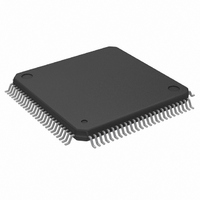M30800SFP-BL#D5 Renesas Electronics America, M30800SFP-BL#D5 Datasheet - Page 137

M30800SFP-BL#D5
Manufacturer Part Number
M30800SFP-BL#D5
Description
MCU 3/5V 0K 100-QFP
Manufacturer
Renesas Electronics America
Series
M16C™ M16C/80r
Datasheet
1.M30803FGGPU3.pdf
(360 pages)
Specifications of M30800SFP-BL#D5
Core Processor
M16C/80
Core Size
16-Bit
Speed
20MHz
Connectivity
SIO, UART/USART
Peripherals
DMA, PWM, WDT
Number Of I /o
45
Program Memory Type
ROMless
Ram Size
10K x 8
Voltage - Supply (vcc/vdd)
2.7 V ~ 5.5 V
Data Converters
A/D 10x10b, D/A 2x8b
Oscillator Type
Internal
Operating Temperature
-20°C ~ 85°C
Package / Case
100-QFP
Lead Free Status / RoHS Status
Contains lead / RoHS non-compliant
Eeprom Size
-
Program Memory Size
-
Available stocks
Company
Part Number
Manufacturer
Quantity
Price
- Current page: 137 of 360
- Download datasheet (4Mb)
M
R
R
16. Serial I/O
UART0 to 4
e
E
1
v
J
6
Table 16.1 Comparison of functions of UART0 to UART4
1 .
0
Note 1: Only when clock synchronous serial I/O mode.
Note 2: Only when clock synchronous serial I/O mode and 8-bit UART mode.
Note 3: Only when UART mode.
Note 4: Using for SIM interface.
C
Continuous receive mode
selection
Serial I/O is configured as five channels: UART0 to UART4.
UART0 to UART4 each have an exclusive timer to generate a transfer clock, so they operate independently
of each other.
Figures 16.1 and 16.2 show the block diagram of UARTi (i=0 to 4). Figures 16.3 and 16.4 show the block
diagram of the transmit/receive unit.
UARTi has two operation modes: a clock synchronous serial I/O mode and a clock asynchronous serial I/O
mode (UART mode). The contents of the serial I/O mode select bits (bits 0 to 2 at addresses 0360
0368
as a UART.
Although a few functions are different, UART0 to UART4 have almost the same functions.
UART2 to UART4, in particular, are compliant with the SIM interface with some extra settings added in
clock-asynchronous serial I/O mode (Note). It also has the bus collision detection function that generates
an interrupt request if the TxD pin and the RxD pin are different in level.
Table 16.1 shows the comparison of functions of UART0 to UART4, and Figures 16.5 through 16.11 show
the registers related to UARTi.
Note: SIM : Subscriber Identity Module
CLK polarity selection
LSB first / MSB first selection
Separate CTS/RTS pins
Serial data logic switch
Sleep mode selection
TxD, RxD I/O polarity switch
TxD, RxD port output format
Parity error signal output
Bus collision detection
Transfer clock output from
multiple pins selection
9
0 .
8 /
B
0
0
0
1
A
16
8
G
u
7
o r
, 0338
. g
0 -
u
1
0
p
Function
0
, 2
0
2
16
0
, 0328
0
5
Page 124
16
and 02F8
Possible
Possible
Possible
Impossible
Possible
Impossible
Possible
Impossible
Impossible
Impossible
CMOS output
f o
3
UART0
2
16
9
) determine whether UARTi is used as a clock synchronous serial I/O or
(Note 3)
(Note 1)
(Note 1)
(Note 1)
Possible
Possible
Possible
Impossible
Impossible
Possible
Impossible
CMOS output
Impossible
Impossible
Possible
UART1
(Note 1)
(Note 1)
(Note 1)
(Note 1)
(Note 3)
Possible
Possible
N-channel open
drain output
Possible
Impossible
Impossible
Possible
Impossible
Possible
Possible
Possible
UART2
(Note 1)
(Note 2)
(Note 1)
(Note 4)
(Note 4)
Possible
Possible
CMOS output
Possible
Impossible
Impossible
Possible
Impossible
Possible
Possible
Possible
UART3
(Note 1)
(Note 2)
(Note 1)
(Note 4)
(Note 4)
Possible
Possible
Possible
Impossible
Impossible
Possible
Impossible
Possible
Possible
Possible
16. Serial I/O
CMOS output
UART4
(Note 1)
(Note 1)
(Note 2)
(Note 4)
(Note 4)
16
,
Related parts for M30800SFP-BL#D5
Image
Part Number
Description
Manufacturer
Datasheet
Request
R

Part Number:
Description:
MCU 3/5V 0K,PB-FREE 100-QFP
Manufacturer:
Renesas Electronics America
Datasheet:

Part Number:
Description:
KIT STARTER FOR M16C/29
Manufacturer:
Renesas Electronics America
Datasheet:

Part Number:
Description:
KIT STARTER FOR R8C/2D
Manufacturer:
Renesas Electronics America
Datasheet:

Part Number:
Description:
R0K33062P STARTER KIT
Manufacturer:
Renesas Electronics America
Datasheet:

Part Number:
Description:
KIT STARTER FOR R8C/23 E8A
Manufacturer:
Renesas Electronics America
Datasheet:

Part Number:
Description:
KIT STARTER FOR R8C/25
Manufacturer:
Renesas Electronics America
Datasheet:

Part Number:
Description:
KIT STARTER H8S2456 SHARPE DSPLY
Manufacturer:
Renesas Electronics America
Datasheet:

Part Number:
Description:
KIT STARTER FOR R8C38C
Manufacturer:
Renesas Electronics America
Datasheet:

Part Number:
Description:
KIT STARTER FOR R8C35C
Manufacturer:
Renesas Electronics America
Datasheet:

Part Number:
Description:
KIT STARTER FOR R8CL3AC+LCD APPS
Manufacturer:
Renesas Electronics America
Datasheet:

Part Number:
Description:
KIT STARTER FOR RX610
Manufacturer:
Renesas Electronics America
Datasheet:

Part Number:
Description:
KIT STARTER FOR R32C/118
Manufacturer:
Renesas Electronics America
Datasheet:

Part Number:
Description:
KIT DEV RSK-R8C/26-29
Manufacturer:
Renesas Electronics America
Datasheet:

Part Number:
Description:
KIT STARTER FOR SH7124
Manufacturer:
Renesas Electronics America
Datasheet:

Part Number:
Description:
KIT STARTER FOR H8SX/1622
Manufacturer:
Renesas Electronics America
Datasheet:











